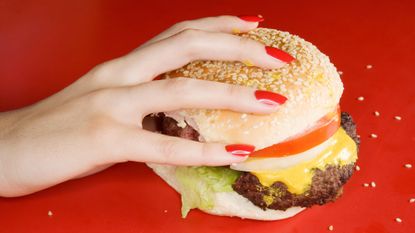

There may be a way to lose weight without changing what you eat: Change when you eat it.
While restricting eating hours (i.e., eating in a small window of time by eating breakfast later and finishing dinner earlier) may not be convenient or ideal for people who get up early and go to sleep late, new research suggests that eating within a nine- to 12-hour daily window could prevent obesity and even cure it — even if your diet's not so healthy, or if you sometimes cheat and eat outside your designated times.
In a 38-week study recently published in the journal Cell Metabolism, scientists fed mice four different diets with the same number of calories but different components: One diet was loaded with fat, another high in fructose, one was high in fat and sucrose, and one consisted of regular mouse food. The researchers let some mice in every diet group eat whenever they wanted, while other mice were only allowed to eat during nine-, 12-, or 15-hour windows. Some lucky guys got cheat days on the weekends, while some less-lucky mice on the eat-whenever-you-want feeding schedule were switched to time-restricted diets halfway through the study.
At the end of the 38 weeks, mice who ate at all hours gained weight, which can lead to some serious health issues. Even though all the mice on time-restrictive diets ate the same amount of calories as the mice who ate whenever, those who ate during nine- or 12-hour windows (and those who sometimes ate outside their designated hours) emerged from the study without weight gain and less body fat than mice that ate the same kind of diet over the course of 24 hours. What's more interesting: The mice that switched diets during the study even lost some of the weight they'd gained. Their actual diets didn't seem to matter as much as when they ate.
Researchers don't know exactly why the body reacts differently to food at different times. One of their theories is that meal timing affects your circadian rhythm, which could either stoke or slow your metabolism.
Either way, the implications of this study are pretty clear (and study authors suggest the findings could ring true in humans too): Limiting your eating hours could help the body fend off weight gain. Of course, there's no reason to fix something that's not broken. If your eating schedule works for you (and your school/job/social life/appetite schedule), and you're in perfectly good health, eat whenever your appetite compels you. Late-night pizza, anyone?
Still, this new science isn't license to trade your salad lunch for the caloric equivalent of dessert, eaten at noon. (Some calories — ahem, those found in fruits and veggies — contain more vitamins and minerals, and provide more sustainable energy than anything you'll find in cake.)
Stay In The Know
Marie Claire email subscribers get intel on fashion and beauty trends, hot-off-the-press celebrity news, and more. Sign up here.
You should also check out:
How to Work Out While You're Binge-Watching Netflix
How to Get the Benefits of a Cleanse Without Actually Doing One
Elizabeth Narins is a Brooklyn, NY-based writer and a former senior editor at Cosmopolitan.com, where she wrote about fitness, health, and more. Follow her at @ejnarins.
-
 Heidi Gardner Opens Up About Viral Moment She Broke Character During ‘Saturday Night Live’ Beavis and Butt-Head Sketch
Heidi Gardner Opens Up About Viral Moment She Broke Character During ‘Saturday Night Live’ Beavis and Butt-Head Sketch“I just couldn’t prepare for what I saw.”
By Rachel Burchfield Published
-
 Fashion, Family, Fitness: The 3 Guiding Principles of 'MC' Editor-in-Chief Nikki Ogunnaike and How They Intersect in Her Life
Fashion, Family, Fitness: The 3 Guiding Principles of 'MC' Editor-in-Chief Nikki Ogunnaike and How They Intersect in Her LifeBy Nikki Ogunnaike Published
-
 Caitlin Clark's WNBA Draft Glow Is Courtesy of Glossier
Caitlin Clark's WNBA Draft Glow Is Courtesy of GlossierShe even wore a just-launched product from the brand.
By Julia Marzovilla Published
-
 Senator Klobuchar: "Early Detection Saves Lives. It Saved Mine"
Senator Klobuchar: "Early Detection Saves Lives. It Saved Mine"Senator and breast cancer survivor Amy Klobuchar is encouraging women not to put off preventative care any longer.
By Senator Amy Klobuchar Published
-
 How Being a Plus-Size Nude Model Made Me Finally Love My Body
How Being a Plus-Size Nude Model Made Me Finally Love My BodyI'm plus size, but after I decided to pose nude for photos, I suddenly felt more body positive.
By Kelly Burch Published
-
 I'm an Egg Donor. Why Was It So Difficult for Me to Tell People That?
I'm an Egg Donor. Why Was It So Difficult for Me to Tell People That?Much like abortion, surrogacy, and IVF, becoming an egg donor was a reproductive choice that felt unfit for society’s standards of womanhood.
By Lauryn Chamberlain Published
-
 The 20 Best Probiotics to Keep Your Gut in Check
The 20 Best Probiotics to Keep Your Gut in CheckGut health = wealth.
By Julia Marzovilla Published
-
 Simone Biles Is Out of the Team Final at the Tokyo Olympics
Simone Biles Is Out of the Team Final at the Tokyo OlympicsShe withdrew from the event due to a medical issue, according to USA Gymnastics.
By Rachel Epstein Published
-
 The Truth About Thigh Gaps
The Truth About Thigh GapsWe're going to need you to stop right there.
By Kenny Thapoung Published
-
 3 Women On What It’s Like Living With An “Invisible” Condition
3 Women On What It’s Like Living With An “Invisible” ConditionDespite having no outward signs, they can be brutal on the body and the mind. Here’s how each woman deals with having illnesses others often don’t understand.
By Emily Shiffer Published
-
 The High Price of Living With Chronic Pain
The High Price of Living With Chronic PainThree women open up about how their conditions impact their bodies—and their wallets.
By Alice Oglethorpe Published